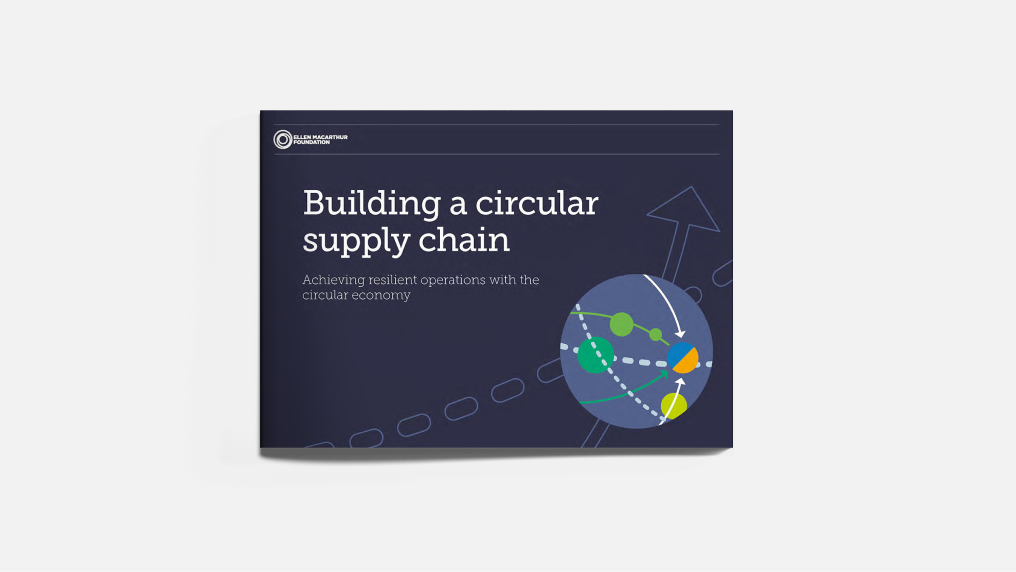Supply chain professionals can reap benefits of a circular economy
New measures to help supply chain leaders take critical steps towards dealing with future global disruptions have been published by the Ellen MacArthur Foundation today (15 November 2023).
The recommended actions set out in a white paper, produced in collaboration with the Circular Supply Chain Network, come in the wake of recent geopolitical shocks and economic uncertainties which have highlighted the need for resilient supply chains.
The ‘Building a Circular Supply Chain’ paper provides insights into the benefits and challenges of moving away from a take-make-waste linear approach and shows the crucial role supply chain professionals play in an increasingly changing world.
It highlights that a circular economycircular economyA systems solution framework that tackles global challenges like climate change, biodiversity loss, waste, and pollution. It is based on three principles, driven by design: eliminate waste and pollution, circulate products and materials (at their highest value), and regenerate nature., where resources are reused and nature is regenerated, offers businesses the opportunity to redesign their supply chains to build resilience, reduce costs and cut greenhouse gas emissions.
Andres Oliva Lozano, Senior Research Analyst at the Ellen MacArthur Foundation, said: “Disruptions such as the COVID-19 pandemic, the Russian invasion of Ukraine, and other recent world events, have exposed the vulnerabilities of traditional linear supply chains and the economic impacts of their weaknesses.
“While searching for resilience, businesses also want supply chain leaders to deliver lower costs and meet increasing environmental expectations. For a typical consumer goods company, the supply chain accounts for more than 80% of greenhouse gas emissions.
“By switching to a circular supply chain and decoupling operations from the consumption of natural resources, businesses have the opportunity to reduce their exposure to price volatility, increase material security, and help meet their environmental objectives.”
Supply chain leaders are critical in the circular economy transition as they are responsible for the sourcing, movement, and transformation of the 100 billion tonnes of materials that enter the global economy each year.
The paper from the Foundation, an international charity developing and promoting the circular economy, shows supply chain professionals can build circular supply chains by focusing on nine areas, from engaging with suppliers to redesigning supply networks.
It provides recommendations for effectively navigating each area, demonstrating how supply chain leaders have an enormous opportunity to deliver economic benefits to businesses and environmental ones to society.
Abe Eshkenazi, Chief Executive Officer of the Association for Supply Chain Management, said: “Building a circular economic model is the best way to deliver resiliency, ensuring our supply chains withstand and bounce back from inevitable shocks, whether it is disease, disaster or war.
“Supply chain professionals in partnership with sustainability and compliance professionals must be proactive about making changes to the way our industry functions – for the good of our livelihood and for the planet.”
The Foundation has produced an accessible fact sheet to accompany its paper.
For further information, please visit emf.org/circular-supply-chains
-Ends-
Notes to Editors
ABOUT THE ELLEN MACARTHUR FOUNDATION
The Ellen MacArthur Foundation is an international charity developing and promoting the circular economy in order to tackle some of the biggest challenges of our time, such as climate change, biodiversity loss, waste, and pollution. We work with our network of private and public sector decision-makers, as well as academia, to build capacity, explore collaborative opportunities, and design and develop circular economy initiatives and solutions. Increasingly based on renewable energyrenewable energyEnergy derived from resources that are not depleted on timescales relevant to the economy, i.e. not geological timescales., a circular economy is driven by design to eliminate waste, circulate products and materials, and regenerate nature, to create resilience and prosperity for business, the environment, and people.



